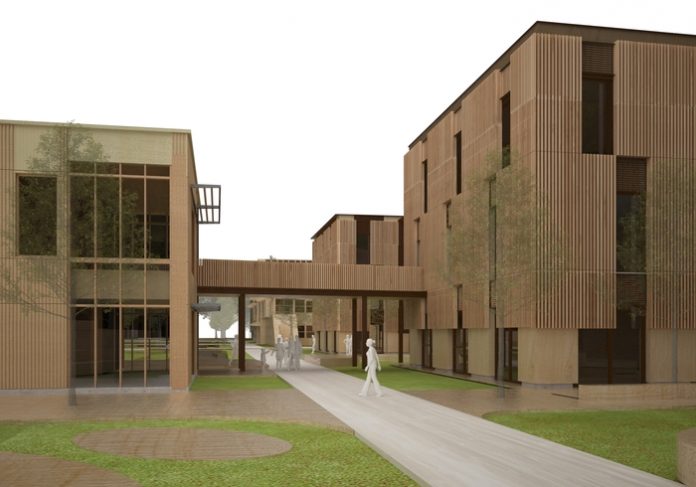Saunders are working on a masterplan for one of the UK’s greenest innovation business villages in Cambridge which is centred around providing significant social and wellness benefits with a focus on landscape led sustainability, low carbon buildings, walking, cycling and outside social/ work spaces. The 90,000 square foot development at Waterbeach, a former Ministry of Defence Site, will be home to a highly sustainable low carbon neighbourhood with offices, a gym, cafes, and abundant landscaped space incorporating a running track, paths and cycling routes linked to the surrounding village and Newtown. The new park will be aimed at attracting start-up pharmaceutical and tech businesses.
The architects have been working alongside Professor John French, a leading sustainability expert, looking at solutions to develop the exemplar, low carbon, sustainable and ecologically sound business village for Cambridge Innovation Parks Limited. Reducing carbon during construction and building, and also to absorb carbon to create a negative carbon development is being explored. Substances like hemp are an affective construction material and will continue to absorb carbon throughout the life of the building. Research includes hemp insulation and render to some external walls, along with other sustainable façade materials.
Three new buildings, built to low embodied carbon standards will form the first phase of the masterplan to compliment two existing buildings on the site. The site lies adjacent to a new town development, Waterbeach Newtown with excellent transport links.
The new offices are designed to accommodate current Covid standards and are naturally ventilated with opening windows and natural lighting. Two of the buildings are proposed to be carbon negative, meaning it they will absorb more carbon in its lifetime than it consumes in its construction and over its lifetime.
The masterplan encourages sustainable modes of transport, buses, shared journeys, electric vehicle journeys, cycling and walking to work; therefore car parking is limited with electric vehicles, public transport and cycle storage taking centre stage. The cycle storage and bus shelters are constructed from sustainable timber and accommodate green sedum roofs to encourage ecology and an exemplar number of easily accessible changing facilities, showers and cycle shelters will be provided.
Director of Saunders Martin Williams commented: ‘This is not a business park as we know it but a lifestyle which fosters a positive work life balance, promotes sustainable, low carbon construction/ design where new businesses and start-ups can evolve, knowing their staff will benefit. We have worked extensively on ensuring sustainability standards are the highest possible and hope we can achieve carbon negative buildings within this first phase of the development‘.



















